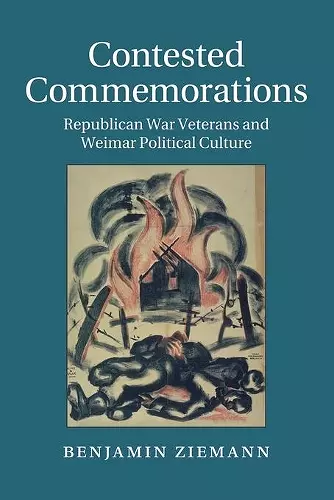Contested Commemorations
Republican War Veterans and Weimar Political Culture
Format:Paperback
Publisher:Cambridge University Press
Published:25th Aug '16
Currently unavailable, and unfortunately no date known when it will be back
This paperback is available in another edition too:
- Hardback£90.00(9781107028890)

An innovative study of remembrance in Weimar Germany and how war experiences and memories were transformed along political lines.
This innovative study of remembrance in Weimar Germany analyses how experiences and memories of the Great War were transformed along political lines after 1918. Examining the symbolism, language and performative power of public commemoration, Benjamin Ziemann reveals how individual recollections fed into the public narrative of the experience of war.This innovative study of remembrance in Weimar Germany analyses how experiences and memories of the Great War were transformed along political lines after 1918. Examining the symbolism, language and performative power of public commemoration, Benjamin Ziemann reveals how individual recollections fed into the public narrative of the experience of war. Challenging conventional wisdom that nationalist narratives dominated commemoration, this book demonstrates that Social Democrat war veterans participated in the commemoration of the war at all levels: supporting the 'no more war' movement, mourning the fallen at war memorials and demanding a politics of international solidarity. It describes how the moderate Socialist Left related the legitimacy of the Republic to their experiences in the Imperial army and acknowledged the military defeat of 1918 as a moment of liberation. This is the first comprehensive analysis of war remembrances in post-war Germany and a radical reassessment of the democratic potential of the Weimar Republic.
'Benjamin Ziemann's book, filled with surprising new material, vigorous new characters and above all, strikingly new perspectives, will significantly alter several generations' understandings of what happened during Weimar … compellingly written, exhaustively researched and rigorously argued, [it] is a powerful contribution to the continuing effort to comprehend the multiple meanings of the Great War.' German History
'A far richer and more complicated picture of Weimar's short-lived democracy emerges from Ziemann's study, one in which a plethora of groups and individuals fought for prominence in the state's public spaces and fought to assert their own symbolic investments over the national culture, especially with regard to the war and its meaning; these are precisely the 'contested commemorations' of the title.' H-Soz-u-Kult
'As Benjamin Ziemann richly illustrates in this book, the end of the Great War was immediately followed in Germany by a heated battle between competing narratives … he is keen to embed the production and reception of culture within its particular historical context. In this, he is brilliantly successful, and his book should be read by all those who wish to take up the theme of the cultural history of war experience of the conflict.' Jesse Kauffman, Seminar: A Journal of Germanic Studies
'Exhaustively researched, intelligently organized and strongly argued, it forces us to reconsider older assumptions about the war's legacy of 'brutalization' and the 'weakness' of the republican settlement of 1918. Ziemann's book has the potential to stimulate a new debate about the reverberations of war between 1918 and 1933 and the reasons why (and if) Weimar ultimately failed. Without doubt, this superb monograph will become compulsory reading for scholars working in the fields of World War I studies and modern European history alike.' Stefan Goebel, German Studies Review
'Ziemann's account stands as a welcome addition to more recent scholarship on the Weimar era that stresses the contingency of politics and culture and rejects more simplistic accounts of a German republic doomed to failure. Most important, Ziemann's history illuminates a hotly contested conflict for the survival of the Weimar Republic fought on the important battlefields of symbol, public performance, and collective memory that provides the reader with important new insights into the complicated nature of Germany's first real experiment with democracy.' Barry A. Jackisch, Central European History
'Seeking to take a fresh look at the historical evidence, Benjamin Ziemann's study of pro-republican commemorations of the First World War is at the fore-front of a gradually consolidating literature that embraces the openness and contingencies of the first German democracy … Ziemann adds to this growing literature a clearly argued and thoroughly contextualized study of the pro-republican war remembrances propagated by the 'Reichsbund of War Disabled, War Veterans and War Dependants' and the 'Reichsbanner Black-Red-Gold' … In emphasizing the 'tremendous persistence' with which Social Democrats elaborated a coherent set of republican war remembrances under highly polarized political conditions, [Ziemann's] study contributes immensely not only to the comparative literature on the remembrance of the First World War, but also to our growing understanding of the performative power and challenges of Weimar democracy.' Manuela Achilles, European History Quarterly
'That the legacy of the First World War was a definitive battleground in Weimar Germany is no surprise, but Benjamin Ziemann's study of republican war veterans significantly recasts the terms of this battle. … Contested Commemorations thus offers further compelling evidence that the Weimar Republic was scarcely a republic without republicans … Ziemann's analysis moves skillfully from the memoirs and articles of individual veterans … to the organizations of republican veterans, their journals, and commemorative activities … [His] elucidation of their campaigns to expose and defy the myths surrounding Germany's war and defeat reveals a much more robust republican movement than is often presumed, one that did not readily surrender in a struggle that ultimately involved the legitimacy of the republican state.' Kathleen Canning, The Journal of Modern History
ISBN: 9781107631830
Dimensions: 229mm x 153mm x 18mm
Weight: 480g
328 pages